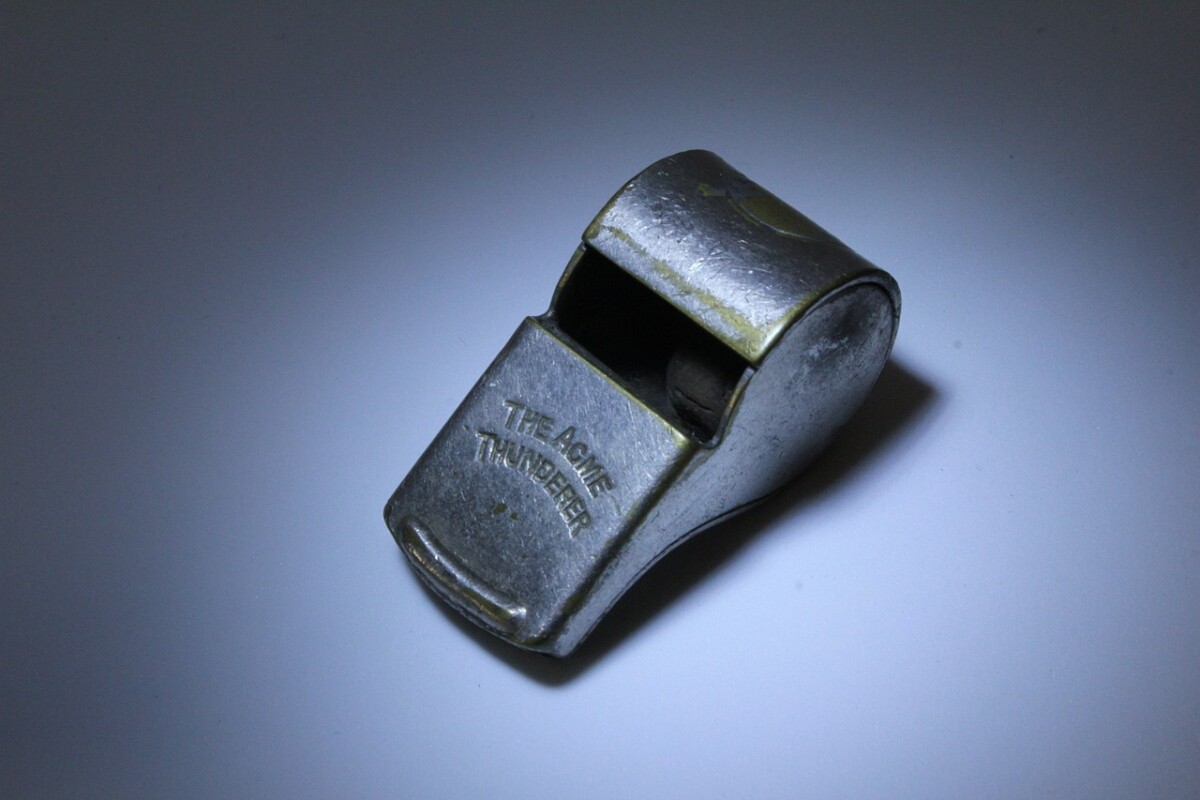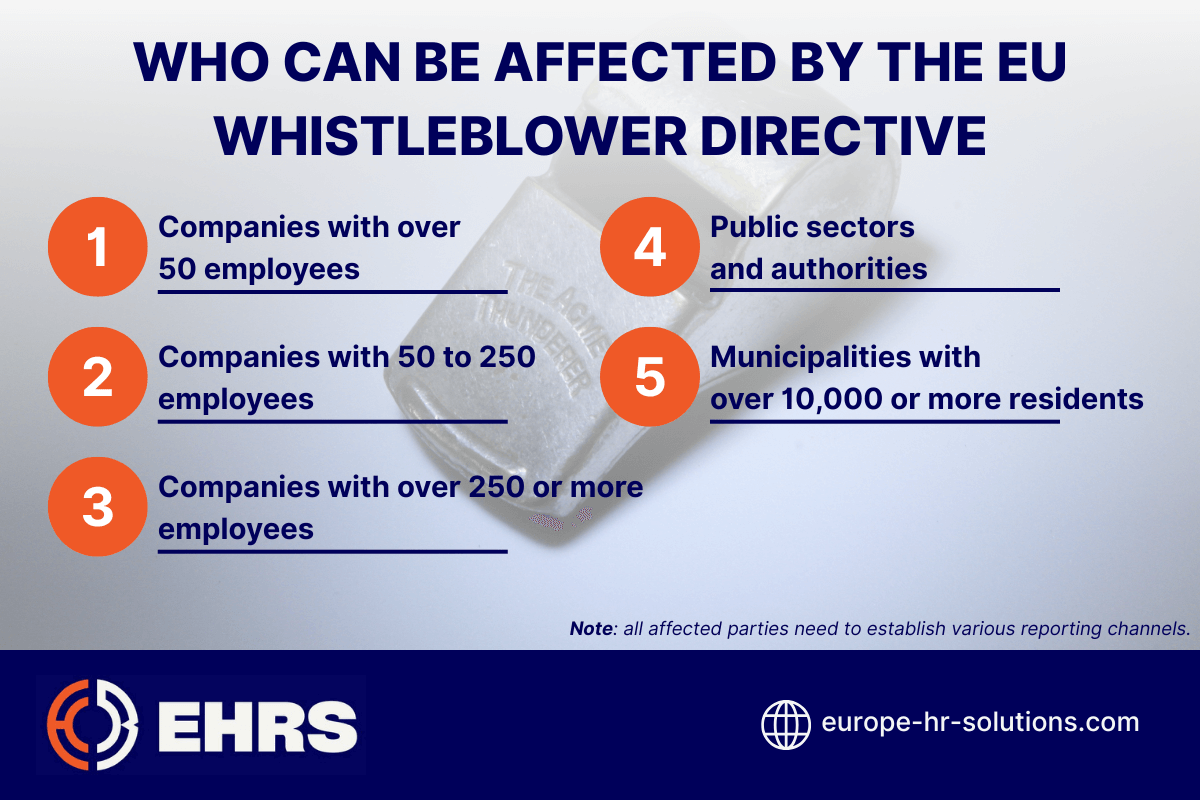The EU Whistleblower directive on the protection of whistleblowers came into effect on December 16, 2019, marking a new shift to protect individuals who report breaches, incidents, or misconduct.
Let’s take a look at how your company can implement this directive effectively, what kind of actions you need to take, and what are the main implications.
What is the EU Whistleblowing Directive?
The EU Whistleblowing Directive is an official directive that marks a big change in how companies across the EU handle whistleblowing. The primary goal is to offer strong protection to all individuals who report violations of EU laws.
Who Can Be Affected by the EU Whistleblower Directive?
Almost all sectors, organizations, and companies can be affected by this directive. Diving deeper into this topic, here’s a breakdown of all possible affected parties:
- Public sectors and authorities – need to establish internal reporting channels
- Municipalities with over 10,000 or more residents – need to establish internal reporting channels
- Companies with over 50 employees – need to establish internal reporting channels
- Companies with 50 to 250 employees – need to comply within 2 years, but have an additional two year leeway after transposition
- Companies with over 250 or more employees – need to comply within 2 years of the directive’s adoption
How to Implement the EU Whistleblowing Directive
The directive requires companies to set up strong protection mechanisms against retaliation, ensure broad compliance and protection for whistleblowers, and establish secure reporting channels.
It applies across all industries, and companies need to prepare with the following, before any implementation is in place:
1) Improved Protection Mechanisms
The directive is specifically designed to shield whistleblowers from any form of retaliation, allowing them to safely report misconduct without fear of negative consequences, such as demotion, dismissal, or various other workplace penalties.
Vice versa as well, HR departments need to also be fully aware of the best practices and remain compliant when handling any form of misconduct.
2) Reporting Channels
Companies are required to set up accessible reporting channels with secure safeguards in place. These may be internal or external, depending on the size of the company, with a direct communication channel to authorities and public platforms.
The choice of the channel will depend on how serious is the nature of the reported incident, misconduct, or violation.
3) Scope & Coverage
This directive also applies across multiple sectors, which include public procurement, product safety, transport, financial services, public health, and environmental protection. It covers both private and public entities, meaning even public sectors are highly involved.
Now that we’ve covered the basics of the EU Whistleblower Protection Directive, let’s see how a company can implement it.
Under this directive, companies with 50 or more employees must implement confidential reporting systems, offer training on reporting options and protections, and establish procedures for reviewing and responding to whistleblower reports.
a) Internal Reporting Systems
Those companies that employ 50 or more people are required to set up internal reporting systems that would guarantee confidentiality and authorize anonymous reporting. These systems need to also allow feedback to whistleblowers with a reasonable timeframe, which is usually within the first three months of the reported incident.
b) Training & Awareness
Employees should be made aware of how these reporting channels are available and what protections are being offered under this directive. For this reason, companies need to implement training programs to create a culture that would encourage speaking up within the organization.
c) Follow-Up Procedures
Companies need to follow clear guidelines and procedures on handling reports, which include the appointment of impartial teams who would conduct investigations. Then, these teams would need to ensure timely and adequate responses to all reported incidents.
EU Whistleblower Directive Implications on Dutch Businesses
Dutch companies and organizations need to update their existing policies on whistleblowers in order to comply with the EU Directive. This would promote a culture of transparency and integrity, ensuring necessary operational adjustments in the process.
- Alignment with the Dutch Whistleblower Code – the Netherlands have their own whistleblower legislation, the Wet Huis Voor Klokkenluiders that offers similar protection that Dutch companies need to align with
- Cultural Considerations – Dutch companies need to create a transparent culture that goes beyond just legal compliance, promoting ethical behavior and open communication in the process
- Operational Adjustment – it is imperative that companies update their internal policies, improve whistleblower reporting features, and ensure all employees are well-versed and fully understand the new protections and procedures.
How to Ensure Compliance with the EU Directive on Whistleblowing
To ensure full compliance, companies need to integrate whistleblowing systems into their risk management frameworks. It will fully embrace the directive and strengthen ethical and legal compliance, using secure technology to safeguard and protect whistleblower data.
These effective systems will act as early warning mechanisms should there be any potential risk. Moving past compliance, companies that embrace the EU Whistleblower Directive can boost their reputation and trustworthiness, as transparency and fairness is a highly valued asset among employees, customers, investors, and stakeholders.
Integrating and complying with a user friendly technology is vital to streamline all reporting processes and ensure the protection and confidentiality of whistleblower data.
Wrapping Up
The EU Whistleblower Directive represents a significant change and advancement in ethical standards and corporate governance throughout Europe.
For companies, especially in the Netherlands, this means aligning with regulations and going beyond just mere compliance. Creating an accountable and transparent workplace culture with excellent reporting mechanisms will improve the ethical reputation and make employees feel safe to report any sort of misconduct.
Companies are encouraged to improve their existing frameworks and implement various necessary changes to increase the integrity. This proactive approach will meet legal requirements along the way and improve the overall reputation of the business.
Frequently Asked Questions (FAQ)
What is the EU Whistleblowing Directive?
The EU Whistleblowing Directive is a directive that requires access to confidential channels for reporting any sort of breaches to EU laws and rules.
What is the Purpose of Whistle Blowing?
The purpose of whistle blowing is to report gross misconduct by exposing information about unethical, illegal, fraudulent, or unsafe activities that occur in a public or private organization.
Is the EU Whistleblowing Directive in the UK?
The simpler answer is no, because the Directive of the European Parliament and of the Council on the Protection of Persons are not implemented in the UK.
However, companies and public institutions in the UK must still comply with the Public Interest Disclosure Act of 1998 as well as the Enterprise and Regulatory Reform Act.
What is the New Whistleblowing Policy?
The new policy expands protections for whistleblowers and cover sexual harassment with the aim to encourage those who are affected to reported incidents without any fear of adverse consequences or retaliation.
What are the Two Types of Whistleblowing?
The two types of whistleblowing are:
- Internal whistleblowing – which keeps the issues within the company
- External whistleblowing – which involves reporting to third parties outside the company, such as agencies or legal authorities






